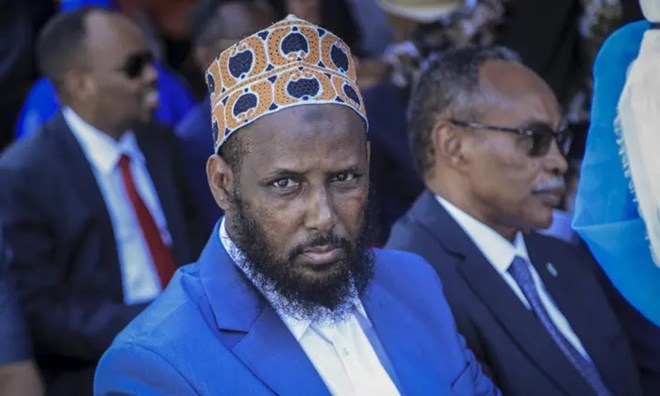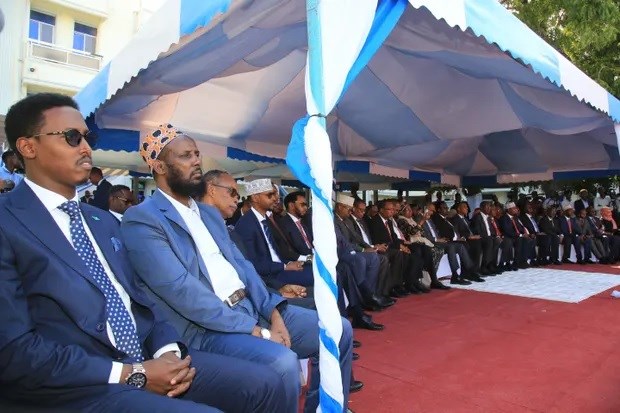
Friday December 2, 2022

The former deputy leader of al-Shabaab, Mukhtar Robow, is now Somalia’s religious affairs minister. Photograph: Farah Abdi Warsameh/AP
Mukhtar Robow talks to the Guardian about his controversial cabinet role as part of ‘ideological front’ to end insurgency
“My whole family is fighting al-Shabaab,” says the former jihadist Mukhtar Robow, peering through his glasses from behind a pile of leather-bound Islamic texts. The normally media-shy former al-Shabaab commander has invited the Guardian into his home in central Mogadishu, Somalia’s capital, at the request of the country’s president, Hassan Sheikh Mohamud. His tone is, by turns, angry and indignant.
Explaining why he decided to join Mohamud’s new cabinet, he cites the toll that al-Shabaab, which has been waging a guerrilla insurgency against Somalia’s fragile central government for about 15 years, has had on his own family: his son was recently killed on the battlefield and his brother-in-law was beheaded by the militants.
“The only crime he had committed was being married to my sister,” Robow says bitterly.
Personal tragedy is not the only reason for his frustration. For the four years leading up to Mohamud’s re-election in May, Robow, who was trained in Afghanistan during the anti-Soviet jihad there, had been kept under house arrest by the controversial former president Mohamed Abdullahi Mohamed, known as Farmaajo.
Robow’s “only crime”, as he puts it, was standing for election as governor of one of Somalia’s five federal states – several years after he had laid down arms and renounced violence to pursue politics – but Farmaajo’s government, wary of Robow’s local popularity, locked up him rather than let him run for office.
“No court case has ever been filed against me,” says Robow, who believes he survived assassination attempts while in detention.
 Mukhtar Robow faces the television cameras in October 2018 to speak about running for the regional presidency in Baidoa, Somalia. Photograph: AP
Mukhtar Robow faces the television cameras in October 2018 to speak about running for the regional presidency in Baidoa, Somalia. Photograph: AP
The recent decision by Farmaajo’s successor to release Robow and appoint him minister for religious affairs represents a seachange in the government’s strategy against al-Shabaab, with potential ripple effects across a region contending with several powerful jihadist groups. The hope is that Robow, who defected from al-Shabaab in 2013 and donated blood for victims of the deadly 2017 truck bombing in Mogadishu, will aid the government in its propaganda war, and help to moderate the more radical, sometimes violent Salafist tendencies prevalent in Somalia.
This forms a key part of what Mohamud calls “total war” against the militants, which also involves squeezing the group’s business interests, and a new military offensive by the national army in coordination with clan militias.
“We can’t give him weapons and ask him to fight, but he can be useful,” the president told the Guardian in a recent interview.
The new approach, which Robow compares to the community-led mobilisation that rid Iraq of Islamic State, has yielded some important territorial gains, especially in the Hiran region of central Somalia. But it has not stopped attacks.
At least nine people were killed and dozens injured in Mogadishu on 27 November when militants attacked a hotel near the presidential palace, while twin car bombings in October killed 100 people, the deadliest attack since 2017’s truck bombing at the same spot.
Robow calls his role the “ideological front”, encouraging religious leaders and scholars to speak out against al-Shabaab in order to “reclaim the Islamic narrative [and] confront their flawed ideology”.
 Somalis in Mogadishu pray for victims at the scene of a massive truck bomb that killed more than 300 people in 2017. Photograph: Mohamed Abdiwahab/AFP/Getty Images
Somalis in Mogadishu pray for victims at the scene of a massive truck bomb that killed more than 300 people in 2017. Photograph: Mohamed Abdiwahab/AFP/Getty Images
This approach was demonstrated at a recent Islamic conference in Mogadishu in which Robow argued that the government should police the teachings of religious scholars, and introduce a licensing system for imams in schools. “People shouldn’t be free to preach whatever they want,” he said.
“Robow is becoming more vocal on the ideological front,” says one presidential adviser. “He is leading the charge and becoming the face of the government’s campaign.”
Tackling al-Shabaab includes controversial elements, such as closing down dozens of websites and online platforms deemed to be affiliated with the group, and even arresting journalists alleged to be sympathetic to the militants. The government recently imposed strict bail conditions on a respected journalist and media rights campaigner that will prevent him from seeking medical attention for a suspected kidney condition aggravated by poor conditions during his detention by intelligence services.
“For the first time the government is tackling their propaganda head on,” says Robow. However, Human Rights Watch has accused the government of deliberately curtailing “legitimate news coverage and free speech by making baseless national security claims”.
The decision to involve Robow, who once had a $5m (£4.16m) American bounty on his head, in the counter-insurgency strategy has been questioned by critics. Many ordinary Somalis find the appointment of a one-time terrorist to a government position distasteful. Others question how effective he can be.
Various Salafist forms of conservative Islam are increasingly well entrenched in Somali society, meaning that Robow, himself a relatively pragmatic Salafist, may struggle to make headway against the more violent strands. What is more, many of al-Shabaab’s rank-and-file members join the group not because of religion but for reasons ranging from anger at successive foreign interventions in Somalia, to economic frustration and clan marginalisation.
“It’s an important symbolic step to signal to current al-Shabaab members that if they are willing to leave the group and renounce violence, there is space for them,” says Omar Mahmood, an analyst at the International Crisis Group. “At the same time, there are some who question if it is the right fit to have someone who formerly promoted al-Shabaab ideology now leading the religious affairs docket. Robow’s experience, however, makes him a key asset.”
 Mukhtar Robow, second left, at his appointment to the Somali cabinet in August. Photograph: Anadolu Agency/Getty
Mukhtar Robow, second left, at his appointment to the Somali cabinet in August. Photograph: Anadolu Agency/Getty
For its part, al-Shabaab has accused their former comrade of treachery, and, in a video statement, put a target above his head. “Robow is an apostate,” said al-Shabaab spokesperson Ali Dheere. “Shedding his blood is permissible.”
The president believes that Robow can convince at least some of his former colleagues to defect. “We want to show the al-Shabaab leadership that if they surrender they will not be humiliated, they will not be mistreated.”
Mohamud told the Guardian that his new minister had established some channels of communication with mid-ranking al-Shabaab members and was encouraging them to switch sides. He added that this was consistent with the rest of his government’s counter-insurgency approach: “We are using the carrot and stick in parallel.”
Robow insists that he has long had ideological differences with the jihadists, and disapproves of their brutality. “I disagreed with their culture and their morals,” he says. “I’m a human being, not a monster.”